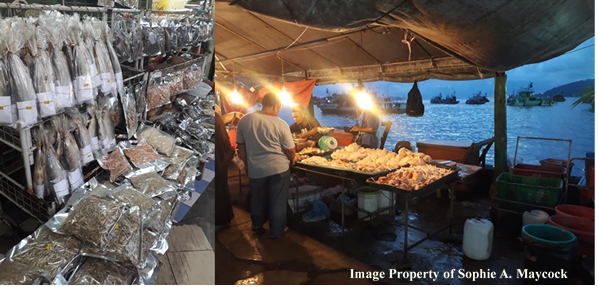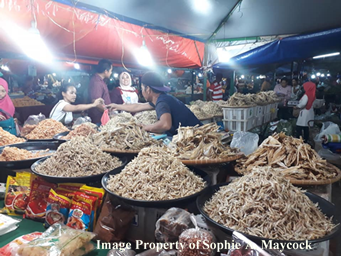SEAFOOD FRAUD IN INDONESIA.
Sophie A. Maycock | 24th June 2020.
Indonesia has a thriving fishing industry. This is not surprising given that the country is made up of more than 17,000 islands with a coastline over 54,000 km long! ManyIndonesian people rely upon seafood as their major source of protein, and fishing and/or selling fish products at markets provides jobs for thousands ofIndonesians.
If you are ever in Indonesia, a stroll around a local market, gawking and marvelling at all the unusual foods they have on display, will undoubtedly be a mind-blowing highlight of your trip. It is very rare for any foods you see at an Indonesia market to be labelled, but all the local people are unperturbed and seem to know exactly what they are looking for and where to find it
While choosing some fish is not troublesome for Indonesian locals, as scientists or conservationists we sometimes find we are a little more than troubled by some species we see for sale at markets. Sometimes, we even find endangered species, which are illegal to fish! Or we find species listed by CITES (the Convention on InternationalTrade in Endangered Species of Wild Fauna and Flora) which prohibits the trade of endangered species. That is obviously a serious problem!
But what if you cannot even tell what it is that is being sold? If the fish are processed it can be very difficult to identify the species by sight. For example, many fish are sold already cut into fillets or with the head removed, which can make identification challenging. Or some fish are sold smoked, dried, salted or boiled and are completely unrecognisable. So what can we do in this instance to stop the illegal trade of endangered species?
The answer has come in the form ofDNA-barcoding.
This process is not too different fromscenes you see in shows like CSI, when beautiful people in lab coats compareDNA from a suspect against DNA found at a crime scene. Except, unlike CSI, theprocess takes a few hours and involves lots of very complicated-sounding scientificwords like, “agarose gel electrophoresis”, “DNA amplification by polymerasechain reaction” and “BLASTN sequencealignment”. What this means is that you take a sample of meat, extract the DNAwithin it and compare specific regions of the code against a database of DNAthat has already been labelled as a certain species, which allows you toidentify exactly which species is being sold. Pretty awesome!
In an Indonesian sample, DNA barcoding exposed that multiple species of “
threatened ” shark species were on sale at a market (Abdullah, 2020). This included
Carcharhinus falciformis (silky shark) IUCN classified “
vulnerable ”,
Alopias pelagicus (pelagic thresher shark) classified “
endangered ” and
Sphyrna lewini (scalloped hammerhead) classified
"critical ” (IUCN, 2020). All of these species are listed in CITES Appendix II, meaning trading products from these animals internationally is strictly controlled (CITES, 2020).
It is entirely possible that people who fish endangered species and also the people who sell the fish at the market do so because they are genuinely ignorant of the law or of the species they are purchasing. It is also possible that multiple different common names used for one species causes confusion in regard to what is and is not legal to trade. However, sadly, sometimes people purpose fully commit fraud by mislabelling fish and substituting cheaper species for more desirable, expensive fish. This seafood fraud happens for many reasons.Primarily, it is more profitable. However, it also occurs due to fisheries stock depletions meaning substitutions are the only way to keep selling desirable products This is not just something that happens in Indonesia! Mis-labelling has been reported in Italy, Brazil, Germany, and India, and there have even been well-publicised examples of international seafood fraud in the USA (Abdullah, 2020).
In order to reduce this practice, governments must enforce strict policies regarding seafood labelling, demanding that all fish products be clearly labelled, so consumers know exactly what they are buying. For this to work in Indonesia, it will be important to clarify which common names are used to refer to which species. It will also be important to explain to local people why this is being done. Clear, non-patronising communication of science is critical in order to engage the general public and gain their support for such initiatives. So, labelling must also go hand-in-hand with community education, to explain to fishers and market sellers why protecting certain species is, in fact, very good for their livelihoods.
For example, as “apex predators” the survival of sharks in critical for the health of the marine environment. This is because many shark species are at the very top of the food web. Apex predators eat “meso-predators”, which eat “herbivores”, which eat seagrass, algae, or phytoplankton (“producers”). If apex predators are “extirpated"(removed entirely from a certain area), they will no longer be enforcing “top-down control” of the ecosystem, meaning that all the other species in the community below them can be impacted. For instance, meso-predators, released from predation by apex predators may flourish, increase in numbers, and decimate herbivore populations. Or, if meso- predators are extirpated, herbivores may flourish and decimate the plant community. This is called a “trophic cascade” (Soulé, 2010). Therefore, removing sharks could threaten other fish stocks or it could cause the collapse of the whole community. This could lead to entire fisheries closures, which could be a serious problem for Indonesian diets and jobs.
For the future, it is critical to ensure seafood fraud is eradicated, endangered species are protected globally and that all exploitation of natural resources are sustainable. If we all work together to improve upon these problems, hopefully our fisheries could remain viable for many generations to come.
References:
Abdullah, A., Nurilmala, M., Muttaqin, E. & Yulianto, I. (2020).
DNA-based analysis of shark products sold on the Indonesian market towards
seafood labelling accuracy program. Biodiversitas
, 21:4,
1385-1390.
CITES (2020). The Convention on International Trade in Endangered
Species of Wild Fauna and Flora:
https://www.cites.org/eng/prog/shark
and https://www.cites.org/eng/prog/shark/other_sharks.php. Accessed 5th June 2020
20:30.
IUCN (2020). The IUCN Red List of Threatened Species. Version
2020-1. https://www.iucnredlist.org. Accessed 5th June 2020
20:50.
Soulé, M.E. (2010). Conservation relevance of
ecological cascades. In: Eds Terborgh, J. &
Estes, J.A. Trophic cascades: predators, prey, and the changing
dynamics of nature
, pp. 337 – 352. Washington, DC: Island Press.
















